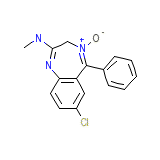Napton




Napton Brand names, Napton Analogs
- A-Poxide
- Abboxide
- Apo-Chlordiazepoxide
- Balance
- CD 2
- CDO
- CDP
- Chloradiazepoxide
- Chlordiazachel
- Chlordiazepoxid
- Chlordiazepoxide Base
- Chlordiazepoxide Hcl
- Chlordiazepoxidum
- Chloridazepoxide
- Chloridiazepide
- Chloridiazepoxide
- Chlorodiazepoxide
- Chlozepid
- Clopoxide
- Clordiazepossido
- Contol
- Control
- Decacil
- Eden
- Elenium
- Helogaphen
- Ifibrium
- Kalmocaps
- Librax
- Librelease
- Librinin
- Libritabs
- Librium
- Limbitrol
- Limbitrol Ds
- Lygen
- Menrium
- Mesural
- Methaminodiazepoxide
- Mildmen
- Multum
- Napoton
- Napton
- Novo-Poxide
- Psicosan
- Radepur
- Risolid
- Silibrin
- Tropium
- Viopsicol
Napton Brand Names Mixture
- Apo-Chlorax Cap (Chlordiazepoxide Hydrochloride + Clidinium Bromide)
- Corium Cap (Chlordiazepoxide Hydrochloride + Clidinium Bromide)
- Librax (Chlordiazepoxide Hydrochloride + Clidinium Bromide)
- Pro Chlorax (Chlordiazepoxide Hydrochloride + Clidinium Bromide)
Napton Chemical_Formula
C16H14ClN3O
Napton RX_link
http://www.rxlist.com/cgi/generic/chlordia.htm
Napton fda sheet
Napton msds (material safety sheet)
Napton Synthesis Reference
No information avaliable
Napton Molecular Weight
299.755 g/mol
Napton Melting Point
236.2 oC
Napton H2O Solubility
2000 mg/L
Napton State
Solid
Napton LogP
2.853
Napton Dosage Forms
Capsule (5 mg, 10 mg or 25 mg)
Napton Indication
For the management of anxiety disorders or for the short-term relief of symptoms of anxiety, withdrawal symptoms of acute alcoholism, and preoperative apprehension and anxiety.
Napton Pharmacology
Chlordiazepoxide has antianxiety, sedative, appetite-stimulating and weak analgesic actions. The precise mechanism of action is not known. The drug blocks EEG arousal from stimulation of the brain stem reticular formation. The drug has been studied extensively in many species of animals and these studies are suggestive of action on the limbic system of the brain, which recent evidence indicates is involved in emotional responses. Hostile monkeys were made tame by oral drug doses which did not cause sedation. Chlordiazepoxide revealed a "taming" action with the elimination of fear and aggression. The taming effect of chlordiazepoxide was further demonstrated in rats made vicious by lesions in the septal area of the brain. The drug dosage which effectively blocked the vicious reaction was well below the dose which caused sedation in these animals.
Napton Absorption
No information avaliable
Napton side effects and Toxicity
LD50=537 mg/kg (Orally in rats). Signs of overdose include respiratory depression, muscle weakness, somnolence (general depressed activity).
Napton Patient Information
Napton Organisms Affected
Humans and other mammals














